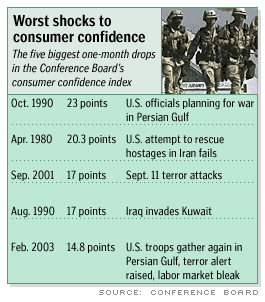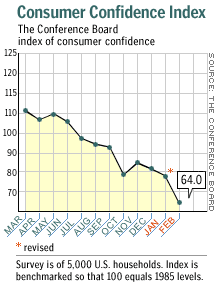NEW YORK (CNN/Money) -
The confidence of U.S. consumers, whose spending fuels more than two-thirds of the nation's economy, crumbled to the lowest level in more than nine years in February, a research group said Tuesday.
Though the drop, which was far worse than economists expected, doesn't necessarily mean consumers will stop spending, it's a sign that the economy's recovery from a recession in 2001 is being seriously tested by unusual events, including war, terror fears and bad weather.

The Conference Board, a business research group based in New York, said its closely watched index of consumer confidence sank to 64 from a revised 78.8 in January. Economists, on average, had expected a reading of 77, according to Briefing.com.
It was the lowest reading for the index since October 1993. It was the fifth-largest one-month drop on record and the biggest one-month drop since the 17-point drop in September 2001, which followed the Sept. 11 terror attacks.
"Lackluster job and financial markets, rising fuel costs, and the increasing threat of war and terrorism appear to have taken a toll on consumers," said Lynn Franco, director of the Conference Board's Consumer Research Center.
The Conference Board's expectations index, which measures how consumers feel about the future, dropped to 65.6 from 81.1, while the present situation index fell to 61.6 from 75.3.
"This month's confidence readings paint a gloomy picture of current economic conditions, with no apparent rebound on the short-term horizon," Franco said.
On Wall Street, stock prices fell after the report but rebounded to end with modest gains. Treasury bond prices rose.
President Bush, addressing reporters Tuesday shortly after the report was released, pressed again for passage of his $1.3 trillion proposal for tax cuts and spending, which he says will help the economy.
| 
| |

| 
| 
|

|
 CNNfn's Allan Chernoff takes a closer look at how the uncertainty of war with Iraq is affecting consumer spending. CNNfn's Allan Chernoff takes a closer look at how the uncertainty of war with Iraq is affecting consumer spending.
|
|
Play video
(QuickTime, Real or Windows Media)
|
| 
|

|
|
"Our policies are aimed at encouraging investment and job creation, as well as consumer confidence and spending," the president said.
Democrats responded by saying the president's proposals don't do enough to stimulate the economy, while adding to budget deficits for the next several years. They pushed their own $136 billion plan, which relies more on short-term stimulus measures.
"Unless we address this with fiscal stimulus that will give us more confidence than we have today, these problems will compound," Sen. Tom Daschle, D-S.D., told reporters.
Separately, the National Association of Realtors said sales of existing homes, the biggest sector of the housing market, jumped to a record annual rate of 6.09 million units in January from a 5.86 million-unit pace in December. Economists, on average, expected a 5-million-unit pace, according to Briefing.com.
"Given the demands of a growing population, and with real estate becoming the safe haven for investment, many factors are in place for a continuation of strong home sales," NAR chief economist David Lereah said.
| Related stories
|

|
|
|
|
A strong housing market, driven by record-low mortgage rates, has been the shining beacon of strength amid an otherwise murky economy. Higher home prices have made consumers feel wealthier, and low rates have encouraged a refinancing boom that's allowed them to take advantage of the surge in home equity.
Home sales help the economy in other ways, since people have to spend money to fix, furnish and refurbish those homes.
Despite their insatiable appetite for houses, however, consumers have been losing confidence for three straight months, according to the Conference Board.
Consumer confidence measures are often not very good at predicting the future course of consumer spending, which makes up more than two-thirds of U.S. gross domestic product (GDP). Despite a three-year bear market in stocks, corporate accounting scandals, terrorist attacks, the possibility of war in Iraq and other woes, consumers have kept on spending.
But some economists worry that the recent drop in confidence could be a sign of things to come, particularly if oil prices, currently at a two-year peak because of supply disruptions and concerns about war in the Persian Gulf, remain high.

"I don't recall a period where we had this kind of a surge in energy prices and didn't have some kind of negative fall-out," said Robert DiClemente, chief U.S. economist at Salomon Smith Barney.
Gasoline prices are approaching record highs, and home heating oil costs have increased as a result of an exceptionally cold winter in some parts of the country. Higher energy costs act as a sort of tax on consumers, cutting into discretionary spending and sapping confidence.
Higher energy prices, along with other rising commodity prices, also are raising production costs for businesses, and they haven't been able to pass those higher prices on to consumers. As a result, corporate profit margins are being squeezed, making businesses reluctant to hire more workers.
Reflecting a weak labor market, 30.1 percent of consumers in the Conference Board survey said jobs are hard to get -- the highest rate in nine years -- compared with 28.9 percent in January.
The percentage of consumers expecting fewer jobs to become available in the next six months jumped to 28.4 percent from 21.2 percent, while those expecting more jobs fell to 12.7 percent from 14.2 percent.
"There are a lot of factors here, but more than anything else, we haven't had a full jobs recovery, and the consumer is waiting for that," Conference Board economist Ken Goldstein said. "These numbers reflect they're kind of running out of patience."
The consensus view among economists is that, once the situation with Iraq is resolved, energy prices will fall and businesses will feel more confident to make plans for the future, leading to a pick-up in investment, an improving labor market and a surging economy.
A minority of economists, however, worry that the post-Iraq economic bounce will be less than enthusiastic. According to this view, businesses still have far too much debt and unused production capacity, the leftovers of the 1990s investment bubble, to give them any incentive to invest for the near future.
If the minority view is correct, economic weakness -- and consumer uncertainty -- could linger.
"If all we've had is consumption, not business investment, there could be a self-fulfilling factor here," Goldstein said. "If consumers run out of patience, they start trimming sales a bit, and the economy, rather than picking up, may weaken a bit. Then the consumer says, 'See, I told you it was going to happen.'"

|

